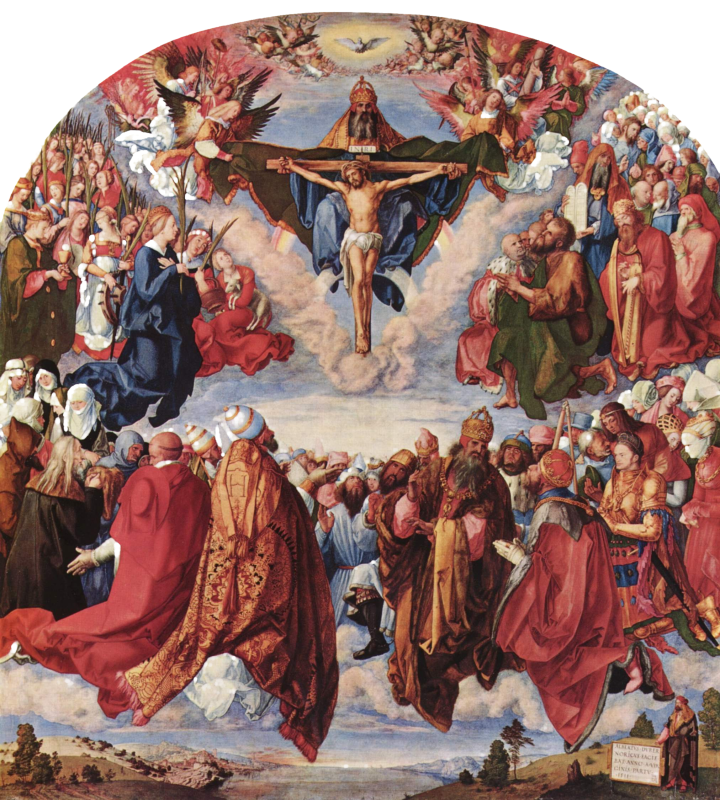Trinity Sunday, or the Solemnity of the Most Holy Trinity, has been kept throughout the Western Church on the Sunday after Pentecost since 1334. It was the Sunday on which Thomas Becket was consecrated a bishop in 1162, and he commanded that the anniversary of his consecration should be celebrated in honour of the Holy Trinity. The Feast was popular, so popular in fact, that the remaining Sundays before Advent were numbered after Trinity, rather than after Pentecost, in England and Wales.
The word itself, Trinity, coined by Tertullian in the second century AD combines the words for three and unity, three persons and one God, and this should not surprise us. Christian worship is Trinitarian, we worship One God: Father, Son, and Holy Spirit. We are baptised in their names, and our eucharist this morning begins ‘In the name of the Father, and of the Son, and of the Holy Spirit, Yn enw’r Tad, a’r Mab, a’r Ysbryd Glân’. The Creed which we are about to say has a tripartite structure, and expresses our belief in the Father, the Son, and the Holy Spirit. We are so used to it that we rarely stop to notice what we are doing, and why we do it. Our worship as Christians helps to form what we believe, and who we are. We believe, we put our trust in the God who created all that is. His Son, Jesus Christ, teaches us to call Him, ‘Our Father’ and so we pray to the Almighty Creator of all things knowing that He is Our Father too, we are in a relationship with a loving parent.
The Father begets the Son, and from Them the Spirit proceeds. Both the Spirit and the Son can be understood as the Wisdom of God described in our first reading this morning, thus the Son is eternally begotten, and the Spirit proceeds, moving over the waters as God creates the universe in Genesis. And between the first and second readings we have the entirety of salvation history, from the Creation of the Universe to the Day of Pentecost. Now, in the outpouring of the Holy Spirit in the Church we experience God in a profound and new way, as St Paul says, ‘because God’s love has been poured into our hearts through the Holy Spirit, who has been given to us.’ (Romans 5:5 ESV) This is reality of the Church, we are filled with the Holy Spirit, a spirit of love and joy. Jesus promises the Spirit to His apostles in John’s Gospel. Jesus promises us a Spirit who will lead us into all truth.
As Christians we worship One God, Father, Son, and Holy Spirit: they are not three Gods, but one God. That the three persons of the Trinity are one God is itself a mystery. The mystery of God’s very self: a Trinity of Persons, consubstantial, co-equal and co-eternal. We know God most fully in the person of Jesus Christ, the Incarnate Word of God, born of the Virgin Mary, who died upon the Cross for our sins, and was raised to New Life at Easter, who sent the Holy Spirit at Pentecost. In Christ God discloses who and what he is, we know Him as someone who pours out LOVE, who is interested in reconciliation. The wonderful thing about the outpouring of the Holy Spirit at Pentecost is that we can know and experience God in a full way. We can know Jesus Christ, the Word made flesh who speaks to us in Scripture, and who comes to us in Bread and Wine, so that we may be fed with His Body and Blood. We are filled with the Holy Spirit, and the point of all this is OUR transformation, by the power of God. We are not celebrating an abstract concept today, but rather a generous and loving God. Our God is not simply remote and transcendent, but one who makes His home with us, gives us His life, and transforms and heals us in LOVE. This is all possible through the relationship God has with us, through His Son and His Spirit, something concrete, personal and real.
In Christ, God becomes human, and can understand us from the inside, so to speak. This is not a distant, impersonal divinity, but one who lives a human life. One who understands our frailty, and who loves us. He sends His Spirit so that we may be encouraged and led into all truth, in the Church. We will face difficulties and hardships. Christ promises us no less, as does St Paul in our second reading. But the point is that these experiences, while painful, can be positive: we grow and develop through them. We become not jaded and embittered, but more loving and forgiving. We become what God wants us to be, so that we can be transformed by His redeeming love. God offers us all the opportunity to be something different, something more than we are, if we let Him change us. If we co-operate with His grace, so that filled with the Holy Spirit, and nourished by Word and Sacrament, God may be at work in us, transforming us into His likeness. So as we celebrate the mystery of the Holy and Life-giving Trinity, let us pray that we may be transformed by God’s love, and share it with others so that they may come to believe and give glory to God the Father, God the Son, and God the Holy Spirit, to whom be ascribed as is most right and just all might, majesty, glory, dominion, and power, now and forever.

No comments:
Post a Comment